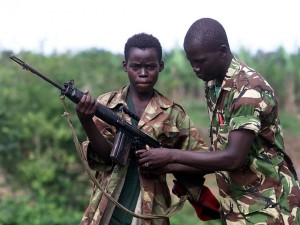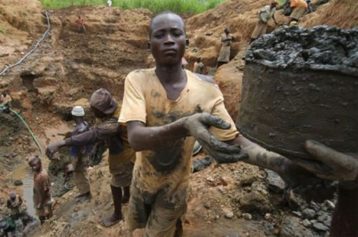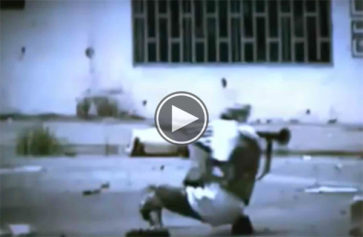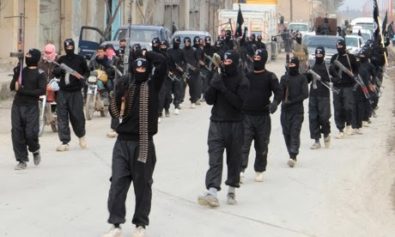
A 14-year-old child soldier for the Sierra Leone Army, Abu Kamara, left, is helped with his British self Loading rifle (SLR) by another soldier while protecting the small town of Ropath near Masiaka, 55 km east of the capital Freetown, May 2000. (AP Photo/Adam Butler)
A British security firm hired mercenaries who were former child soldiers in Sierra Leone, employing them for the U.S. war in Iraq because they provided cheap labor.
As The Guardian reported, Aegis Defense Services — which is chaired by MP Sir Nicholas Soames, Winston Churchill’s grandson — had contracts in the hundreds of millions of dollars to protect U.S. military bases in Iraq since 2004. Beginning in 2011, after recruiting people from the U.K., U.S. and Nepal, Aegis hired staff from African countries, including Sierra Leone. Further, the firm did not ask if the recruits were former child soldiers.
According to The Guardian, these soldiers from Sierra Leone were paid $16 a day. Moreover, according to “The Child Soldier’s New Job,” a documentary which aired Monday in Denmark, the approximately 2,500 Sierra Leonean personnel hired by Aegis and other private security firms in Iraq included former child soldiers. And this was done as a cost-saving measure, as James Ellery, an Aegis director from 2005 to 2015, told The Guardian. Ellery argued that contractors had a “duty” to recruit from nations such as Sierra Leone, “where there’s high unemployment and a decent workforce” in order to save money for the U.S. forces in Iraq.
“You probably would have a better force if you recruited entirely from the Midlands of England,” Ellery said. “But it can’t be afforded. So you go from the Midlands of England to Nepalese etc etc, Asians, and then at some point you say I’m afraid all we can afford now is Africans.”
“There’s an inherent racism in paying security guards less depending on the country they are coming from when they are facing the same risks as a guard from the UK,” said Labor MP Chi Onwurah, who chairs a group on Africa in the British parliament.
“When war gets outsourced, then the companies tries to find the cheapest soldiers globally. Turns out that that is former child soldiers from Sierra Leone. I think it is important that we in the West are aware of the consequences of the privatization of war,” said Mads Ellesøe, the filmmaker.
Meanwhile, GardaWorld, a Canadian security company that took over Aegis in 2015, denies the claims they employed former child soldiers.
“We worked very closely with our audited, vetted and authorized agents to recruit, vet and screen our professionals,” said Graham Binns, former CEO of Aegis and senior managing director of GardaWorld. “Our agents were authorized [as was the employment of individuals] by the relevant national government of the countries from which we recruited.”
He added, “Aegis takes issues pertinent to our industry, such as post-traumatic stress very seriously, and has worked closely with experts in the field to develop and implement procedures for the management of trauma risk.”
Throughout the world, there are an estimated 300,000 child soldiers, according to the BBC. Children have been used in wars taking place in countries such as Sierra Leone, Liberia, Congo, Sudan, Sri Lanka, Afghanistan and Burma.
According to a 2010 paper published in the Journal of Adolescent Health — “Sierra Leone’s Child Soldiers: War Exposures and Mental Health Problems by Gender” — child soldiers are both boys and girls “who are part of any kind of regular or irregular armed force or armed group in any capacity, including, but not limited to: cooks, porters, messengers and those recruited for sexual purposes and for forced marriage.”
In Sierra Leone’s bloody civil war between 1991 and 2002, thousands of children fought for the main rebel group known as the Revolutionary United Front, as well as the Civilian Defense Forces and the Sierra Leone Army. As a result of the conflict, tens of thousands of civilians were killed, and nearly 75 percent of the population was displaced. Although some children volunteered, most were recruited by force, and with 50 percent abducted at the age of 15 or younger.
According to the study, 42 percent of boys and 28 percent of girls were trained as soldiers, and children experienced nearly equally high rates of abuse by armies across gender.
“Comparable numbers of male and female former child soldiers were beaten, threatened with murder, shot, deprived of food, and forced to take drugs. Contrary to our hypotheses, boys and girls were equally likely to have been involved in injuring or killing others,” the authors wrote. Further, there were high incidents of rape and sexual abuse of female child soldiers.
In addition, according to a 2005 study from the University of Ottawa, child soldiers felt a sense of power when they handled weapons, in their transition from victims to hardened perpetrators. Even as they exerted power over civilian populations, they drifted between the role of victim and victimizer. Following the civil war in Sierra Leone, these former child soldiers — who were abducted under traumatic circumstances — are socially and economically marginalized.
“With few viable alternatives, many male and female ex-combatants are turning to petty crime and drug use in order to cope and survive. Female combatants also reported involvement in prostitution,” according to the report. Further, some have resorted to violence as a way to express their anger and frustration.
Sierra Leone once played a major role in the transatlantic slave trade, and its capital of Freetown became a place for repatriated former slaves. The country’s rich natural resources, particularly so-called “blood diamonds” and other minerals, helped to fuel conflicts and fuel the civil war. According to data from the U.N. and the World Bank, Sierra Leone, with a population of 6.1 million, has a life expectancy of 48 years for men, and 49 years for women. As the BBC reported, the nation is grappling with widespread poverty and low literacy rates.
Meanwhile, children in Sierra Leone and elsewhere often find themselves as the most vulnerable in times of war. And in other African nations such as the Central African Republic, children have been subjected to sexual abuse by U.N. peacekeepers.


